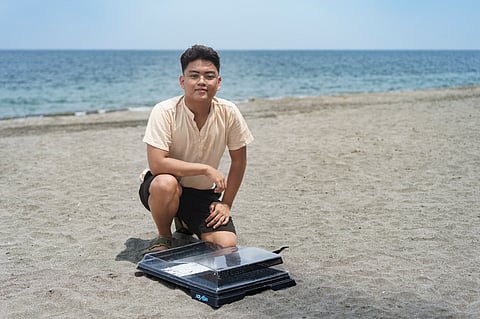
- NEWS
- the EDIT
- COMMENTARY
- BUSINESS
- LIFE
- SHOW
- ACTION
- GLOBAL GOALS
- SNAPS
- DYARYO TIRADA
- MORE

Fresh from winning the 20th James Dyson Award in the Philippines, University of the Philippines Diliman student John Carlo Luna Reyes is setting his sights on developing SolAsin — not just as a tool to revive coastal livelihoods, but also as a gateway for Filipino producers to enter the premium salt market.
“The table salt that’s usually sold in wet markets is considered low-value salt, the kind we use every day for cooking. Flaky salt, on the other hand, belongs to the premium side of the market. It’s what we call a finishing salt — typically used sparingly, like a topping for steak. Its price point is much higher compared to table salt, usually around P300 to P500 per 240 grams,” Reyes told the DAILY TRIBUNE in Filipino during an interview on Straight Talk.
According to Reyes, no local brands currently compete with imports in this high-value segment, presenting “a good opportunity for us to finally develop our own brand.”
Reyes received P361,300 in prize money for SolAsin, a compact, solar-powered salt-farming unit. Most of the funds, he said, will be directed toward prototype development.
“The prize money will be a big help in developing the prototype. There are still many components that need to be produced, like molds and the manufacturing process itself, which also require funding. A portion will also go to pilot testing — bringing the prototype to coastal communities and determining what needs to be improved,” Reyes explained.
SolAsin is designed to be manufactured through thermoforming, with a stackable design to minimize costs. Reyes said this makes it “more affordable compared to traditional methods, which require land, machinery to prepare the land, and other materials before it can even be used for salt production.”
The plan is to make SolAsin available in local hardware stores, ensuring accessibility to coastal households.
Reyes underscored the importance of collaboration with both private and public stakeholders.
“Investors would be a huge help since their support can further refine the prototype. The government, for its part, can provide backing for this development and invention so it can be properly implemented in coastal communities and boost local salt production,” he said.
He added that he hopes the recognition from the James Dyson Award “will open doors to connect with organizations that can help with the development and implementation of SolAsin,” noting his plans to coordinate with relevant agencies.
